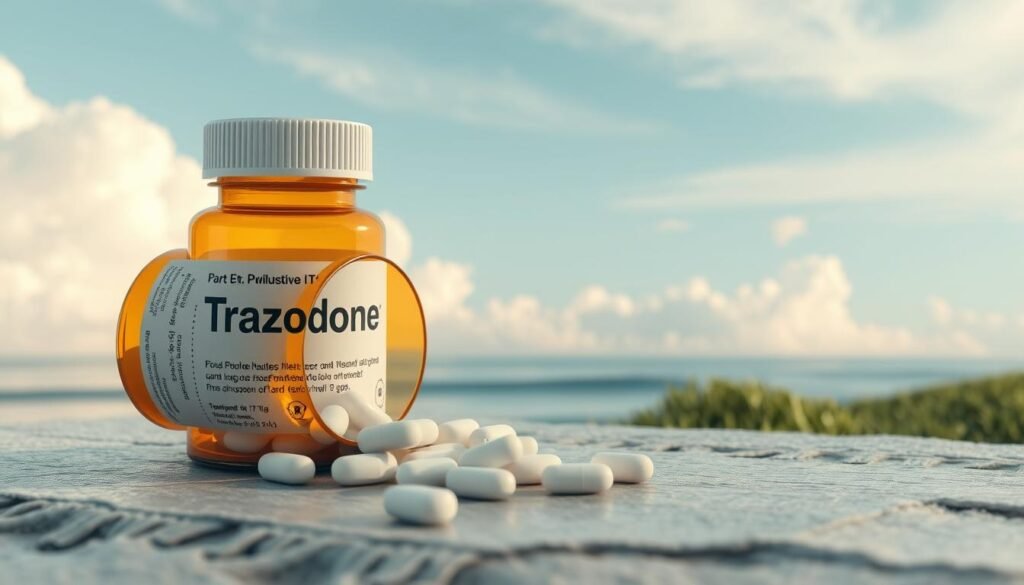Nearly 40 million adults in the United States are fighting anxiety disorders. This fact shows how vital effective treatments are. Trazodone is often chosen, even though it’s mainly used as an antidepressant. The correct trazodone dose for anxiety varies from person to person. Finding the right amount is key for the best results in treating anxiety with trazodone.
When we talk about using trazodone for anxiety, it’s crucial to know all about dosing and safety. People looking for relief need to have accurate information. This way, they can make informed decisions on their treatment path.
Key Takeaways
- Trazodone dosages for anxiety typically range from 50mg to 100mg, two to three times daily.
- The total daily limit for trazodone should not exceed 400mg.
- The starting dose for elderly patients may be as low as 12.5mg daily.
- In cases of pediatric use, dosages between 0.35mg to 2.1mg are utilized.
- Monitoring by healthcare professionals is crucial for doses of 400mg or above.
Understanding Trazodone and Its Uses
Trazodone is a type of antidepressant known as a serotonin modulator. It’s mainly used to treat major depressive disorder (MDD). Besides, it can help with anxiety when prescribed off-label. This medication boosts serotonin in the brain. This action helps stabilize mood and reduce anxiety feelings.
About 25% of people with MDD get the help they need. Across the world, 121 million people struggle with depression. This shows a big gap in effective treatment. Trazodone has been used since the 1970s. In the early 2010s, a new prolonged-release form was approved in the USA. Its different tablet forms let doctors tailor treatment for depression and anxiety.
Trazodone works in two main ways in studies. It stops the serotonin transporter and blocks certain serotonin receptors. This special action may make the treatment easier to handle for many patients. For anxiety, doses range from 50mg to 100mg, up to three times daily. But the total dose shouldn’t pass 400mg a day. The exact dose can change based on how patients react to ensure the best results.
Some common side effects of trazodone are sleepiness, headaches, dizziness, and dry mouth. Serious side effects like low blood pressure when standing up don’t happen often. It’s important to know these details when considering trazodone. This helps people looking for better mental health find their way.
How Trazodone Works for Anxiety
Trazodone works as both an antidepressant and a trazodone anxiety treatment. It increases serotonin levels by stopping their reuptake. This action is crucial in improving mood and reducing anxiety.
People using trazodone have felt a calming effect. This makes it easier for them to deal with things that trigger their anxiety. Though mainly for depression, its use for anxiety relief is gaining attention. It is often prescribed off-label for this purpose, showing its versatility in mental health treatment.
Research backs up trazodone’s ability to lessen anxiety. A study in 1993 showed it was as helpful as diazepam (Valium) for general anxiety disorder. Further studies in 1987 also noted better conditions in those with panic disorder or agoraphobia.
Trazodone is also helpful for sleep issues and nightmares from PTSD. Side effects like sleepiness can help people with anxiety sleep better. For more details, check out how long it takes trazodone to work.
However, it’s key to know about possible side effects such as dizziness, dry mouth, and headaches. More serious issues, like increased suicidal thoughts in younger patients, need careful watch. Even with these concerns, trazodone is a helpful choice for treating trazodone for anxiety and depression. This underscores the need for careful doctor oversight during treatment.
Trazodone Dosage for Anxiety
Trazodone is a common choice to help ease anxiety. Doctors start patients on a low dose. Usually, this starting point is about 75mg each day. Such an amount helps doctors see how well the drug works for the patient. It also keeps side effects to a minimum.
Recommended Starting Dosage
The initial dose for easing anxiety with trazodone is typically 75mg. This level balances effectiveness and safety. If patients notice any side effects, it’s crucial they talk with their doctors. Open communication helps adjust the treatment as needed.
Adjusting Dosage Based on Response
If more help with anxiety is needed, the dose may be increased. Doctors usually add 50mg every few days, not exceeding 300mg daily. This step-by-step increase helps find the right amount for each person. Regular check-ins with the doctor ensure the dose is still working well. Changes are made based on how well the medication is managing anxiety.
| Dosage Form | Available Strengths |
|---|---|
| Tablets | 50mg, 100mg, 150mg |
| Capsules | 50mg, 100mg |
| Liquid | 10mg/ml, 20mg/ml |
Forms and Strengths of Trazodone
Trazodone helps with anxiety and comes in different forms for everyone. Knowing about these forms lets doctors make the best treatment plans.
Available Dosage Forms
Trazodone is found in:
- Oral Tablets: They come in 50mg, 100mg, 150mg, and 300mg.
- Capsules: You can get them in 50mg and 100mg.
- Liquid Form: It’s got either 10mg or 20mg of trazodone in each milliliter, great for those hard at swallowing pills.
Major Dosage Strengths
The variety of trazodone strengths makes it easier to adjust dosages. This is how doctors find what works best.
| Form | Strengths Available |
|---|---|
| Oral Tablets | 50 mg, 100 mg, 150 mg, 300 mg |
| Capsules | 50 mg, 100 mg |
| Liquid | 10 mg/mL, 20 mg/mL |
For treating anxiety with trazodone, the dose ranges from 75mg to 300mg daily. It depends on what the doctor thinks is best.

Administration Guidelines for Trazodone
Knowing how to properly take trazodone is crucial for people dealing with anxiety. Taking it after meals can lessen stomach upsets and improve how well it works. For those taking up to 300mg of trazodone anxiety medication dosage, it’s often suggested to take it all at bedtime. This uses its ability to make you sleepy, helping with sleep problems tied to anxiety.
If you need a higher dose, it might be split into two daily doses. Table 1 below shows the suggested doses for dealing with depression and anxiety.
| Indication | Starting Dosage | Typical Dosage | Maximum Dosage |
|---|---|---|---|
| Depression | 100mg | 150mg | 400mg (outpatients) |
| Anxiety | N/A | 75mg | 300mg |
It’s key to watch how it mixes with other meds. Certain drugs can lead to serotonin syndrome when used with trazodone. People with heart problems should also watch for signs of QT prolongation. Understanding these details makes treatment safer and more effective.
Patient safety is always the top concern. Symptoms of an overdose, like nausea, drowsiness, and confusion, need quick medical help. Keeping up with check-ups helps adjust the trazodone anxiety medication dosage based on how someone is responding. To learn more about trazodone’s benefits and use, check out this thorough guide.
Potential Side Effects of Trazodone
Trazodone treats anxiety and depression. It has side effects to consider. Knowing these can help patients make wise choices.
The common side effects can change based on how each person reacts to the trazodone anxiety dosage.
Common Side Effects
Many people face common side effects with trazodone. These can disrupt daily life at first. Typical ones include:
- Feeling sleepy or tired
- Headaches
- Nausea
- Constipation
- Dry mouth
Many of these problems lessen as the body gets used to the medicine. Less than 1 in 1,000 might face severe issues. Watching for unusual symptoms is crucial.
Serious Side Effects to Watch For
Though rare, severe side effects need fast action. Watch out for:
- Yellow skin or eyes, which could mean liver issues
- More infections like sore throats or skin problems
- A painful erection lasting over 2 hours (priapism)
- Odd heartbeats
- Intense allergic reactions, like swelling or trouble breathing
- More thoughts of suicide, especially in those under 24
Being aware of all possible side effects, including serotonin syndrome signs like restlessness, helps with safe use. It shows why dose management and doctor advice are key. For full trazodone details, including other treatment options, see this resource.

| Common Side Effects | Serious Side Effects |
|---|---|
| Drowsiness | Yellowing of skin or eyes |
| Dry mouth | Increased infections |
| Constipation | Painful lasting erection |
| Nausea | Abnormal heartbeats |
| Headaches | Severe allergic reactions |
How Long to Take Trazodone for Anxiety
Trazodone’s use for anxiety varies from person to person. Some might need it just for a short time. Others, dealing with ongoing anxiety, may need it longer. Doctors often suggest using trazodone for at least six months after feeling better. This helps keep symptoms from coming back and keeps emotions stable.
Trazodone starts to ease anxiety within a few weeks for many patients. They tend to feel calmer and sleep better soon, usually in the second or third week. Keeping up with the treatment as advised makes it more effective.
When it’s time to stop trazodone, doing it slowly is best. This approach helps avoid withdrawal symptoms like dizziness, feeling uneasy, or trouble sleeping. Working closely with healthcare providers is important for a smooth change and good anxiety control.
If there’s no improvement after two weeks, seeing a doctor is crucial. They may need to adjust the dose or try something else. Getting professional help is key to managing anxiety well.
When to Consult Your Doctor About Dosage Adjustments
It’s crucial for patients on trazodone for anxiety to check in with their doctors regularly. This helps make sure the dosage is working well. If problems or side effects don’t go away, it’s important to get medical advice. Changes might be needed to get the best results from treatment.
Starting off, patients often take 150 mg of trazodone a day, in several doses. The dose can go up by 50 mg every few days until symptoms get better. The highest dose can be up to 400 mg daily. In tough cases, especially for those in the hospital, it might go up to 600 mg. It’s very important for doctors to keep a close eye on this, especially for older patients.
If you’re taking trazodone and start feeling very different in mood or behavior, tell your doctor. This is really key for teens and young adults because of an increased risk of suicidal thoughts. Regular check-ups with the doctor can help handle these risks. Plus, if you have symptoms like a fast heartbeat or muscle spasms, see a doctor right away.
How you take trazodone matters too. Taking it at the same hour daily helps control anxiety. If you skip a dose, it can mess up the medication’s level in your body. Always follow your doctor’s instructions on what to do if you miss a dose. This helps avoid trouble.
Better safety and outcomes come from talking openly with your doctor about how you’re using trazodone for anxiety. For more on dosage and side effects, click here.

Important Considerations and Warnings
Trazodone is a key option for treating anxiety. But, it’s crucial to know about possible drug interactions and precautions for certain people. Keeping these in mind ensures safe and effective treatment.
Medication Interactions
Trazodone can interact with certain medications, such as MAOIs and drugs affecting serotonin. Mixing them can cause serious problems like serotonin syndrome. It’s important to talk to doctors about all drugs and supplements you’re taking.
Precautions for Specific Populations
Pregnant or breastfeeding women and those with heart problems need to be cautious with trazodone. It might harm the baby or worsen health issues. Always talk to your doctor before starting it.
| Population Group | Precautions | Potential Risks |
|---|---|---|
| Pregnant Women | Consult physician before use | Possibly affects fetal health |
| Breastfeeding Women | Monitor infant for side effects | Unknown effects on breastfeeding infants |
| Individuals with Heart Conditions | Regular monitoring needed | Increased risk of cardiac events |
| Geriatric Populations | Start with lower dosages | Heightened sensitivity to side effects |
Conclusion
Trazodone can be a promising option for individuals seeking relief from anxiety. It offers dosage flexibility, ranging from 150 to 375 mg. Working closely with healthcare providers is crucial. They help set the right dose, ensuring the treatment works well while watching for side effects.
This medication is often given on an off-label basis. So, careful consideration is needed, especially for the elderly. They may start with lower doses.
Studies show trazodone works well for insomnia and anxiety, including when depression is involved. It stands out in clinical settings, even when other treatments might not work. However, it’s important to know its effects might take weeks to kick in. Users should also be aware of possible drowsiness.
Seeing a healthcare professional regularly is key. They can adjust the dose of trazodone for anxiety as needed and make sure it’s safe. With the right management, trazodone can greatly improve life for those with anxiety disorders.
For more details on trazodone for insomnia and anxiety, check out comprehensive studies on its effectiveness.